fuel injection tube
Oct . 06, 2024 10:08 Back to list
fuel injection tube
Fuel Injection Tubes A Crucial Component in Modern Internal Combustion Engines
In the realm of automotive engineering, few components are as integral to engine performance and efficiency as the fuel injection tube. This relatively unassuming part plays a pivotal role in ensuring that fuel is delivered to the engine in the optimal manner, contributing significantly to engine power, emissions, and overall efficiency.
The fuel injection tube, often referred to as the fuel rail, is primarily responsible for directing pressurized fuel from the fuel pump to the individual fuel injectors located in the engine. These tubes are designed to handle high pressures, typically between 30 to 80 psi, depending on the engine design and fuel system specifications. Their construction is of utmost importance, as they must withstand not only the pressure of the fuel but also the corrosive nature of the fuel itself and the high temperatures generated within the engine compartment.
One of the fundamental reasons for the development of electronic fuel injection (EFI) systems was to replace the older carburetor systems, which were less efficient and had more difficulty adapting to varying operating conditions. With EFI, the fuel injection tube serves a critical role in maintaining the correct air-fuel mixture necessary for combustion. The injector sprays a fine mist of fuel directly into the combustion chamber or intake manifold, allowing for better atomization and, consequently, a more complete combustion. This enhances engine performance, reduces fuel consumption, and minimizes harmful emissions.
fuel injection tube

Furthermore, the design of the fuel injection tube can have a significant impact on the engine's overall performance. The diameter of the tubes, the materials used, and their routing through the engine bay all influence fuel flow and pressure consistency. For high-performance engines, engineers may opt for specialized tubes made from lightweight, high-strength materials such as aluminum or stainless steel. These materials not only help to reduce weight but also assist in heat dissipation, which is crucial for maintaining fuel viscosity and preventing vapor lock—a condition where the fuel vaporizes in the line, leading to poor engine performance.
Modern fuel injection systems have become increasingly sophisticated, with advancements in technology leading to variable injection timing and multi-point fuel injection. This means that instead of a single fuel injector supplying fuel to all cylinders (as seen in older systems), modern setups can control multiple injectors individually, optimizing the mixture for each cylinder based on a variety of parameters, including engine temperature, load, and speed. This precision allows for a smoother operation, improved throttle response, and better fuel economy.
As environmental regulations become stricter, the efficiency of fuel injection systems and their components, such as the fuel injection tube, is more critical than ever. Manufacturers are constantly seeking new ways to improve the accuracy of fuel delivery, reduce emissions, and enhance the overall performance of their vehicles. This quest for efficiency has sparked innovations such as dual-injection systems, where both port and direct injection techniques are used in tandem. Such innovations further highlight the importance of the fuel injection tube in modern engine systems.
In conclusion, the fuel injection tube is an essential component in the operation of internal combustion engines. Its role in delivering fuel efficiently and effectively has a direct impact on engine performance, emissions, and fuel economy. As technologies evolve and the automotive industry moves towards more sustainable practices, the significance of this humble yet vital component cannot be overstated. Understanding the mechanics and engineering behind fuel injection tubes not only sheds light on their importance in vehicle performance but also highlights the ongoing innovation in the field of automotive engineering, ensuring that the future of transportation is as efficient and environmentally friendly as possible.
